Disclaimer: This blog post contains affiliate links. If you make a purchase through these links, I may earn a small commission at no additional cost to you. Learn More. Thank you for supporting our garden community.
How to Deter Slugs in the Garden Naturally
Slugs can be one of the most frustrating pests in the garden, leaving behind chewed leaves, ruined seedlings, and a trail of slime. Whether you’re growing vegetables, herbs, or flowers, controlling slugs is essential for a thriving garden. In this guide, we’ll explore how to deter slugs in the garden naturally.
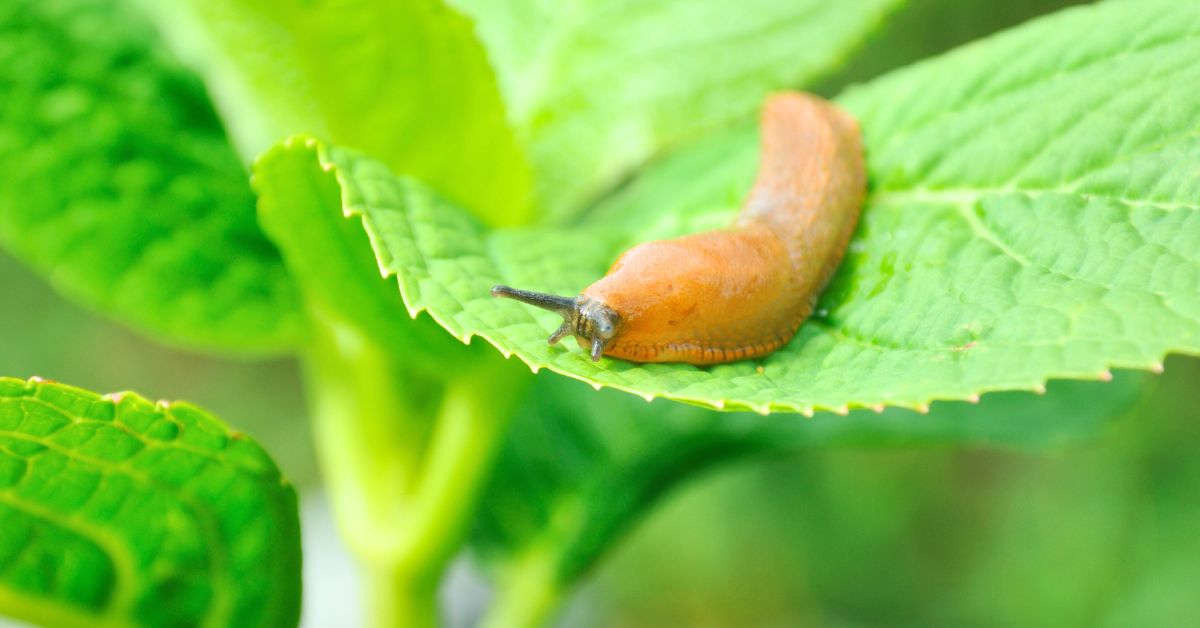
How to Deter Slugs
I know that whenever I plant new seedlings in my garden, I have to cover them immediately. If I don’t, slugs will have a feast that night.
They eat the seedlings right down to the ground, along with many other vegetable crops.
They cause lots of problems and really are an annoying pest.
But there are ways to combat slugs and deter them from your vegetables.
So let’s get right into how to deter slugs from your garden naturally.
Disclaimer: All of these methods for deterring slugs also work for deterring snails.
Products
To buy high-quality garden seeds, check out Burpee.
For a wide selection of perennial garden plants, check out Nature Hills Nursery.
For gardening equipment, check out Bootstrap Farmer.
Are Garden Slugs Good or Bad?
Slugs are nocturnal, meaning they are active at night. This means that you can only catch them when it is dark outside, which is when they eat.
Because this is such a large, undisturbed eating window, they can quickly devastate your crops. They chew on the leaves of plants and leave them with many holes.
This weakens your crops and will eventually reduce your harvest.
Where do Slugs Hide?
It’s important to know where slugs hide and live in order to deter them.
They love dark and moist environments. Slugs are very soft-bodied, meaning they can’t be out for too long before they dry up and die.
So they like to hide under debris, logs, rocks, and mulch, and between plant leaves and in the weeds.
Think about piles of mulch, wood, rocks, or any overgrown areas. These tend to create lots of small, moist, and dark crevices that slugs love to hide in during the day.
Think also about fallen leaves, wooden boards on the ground, and other places that create humidity and darkness.
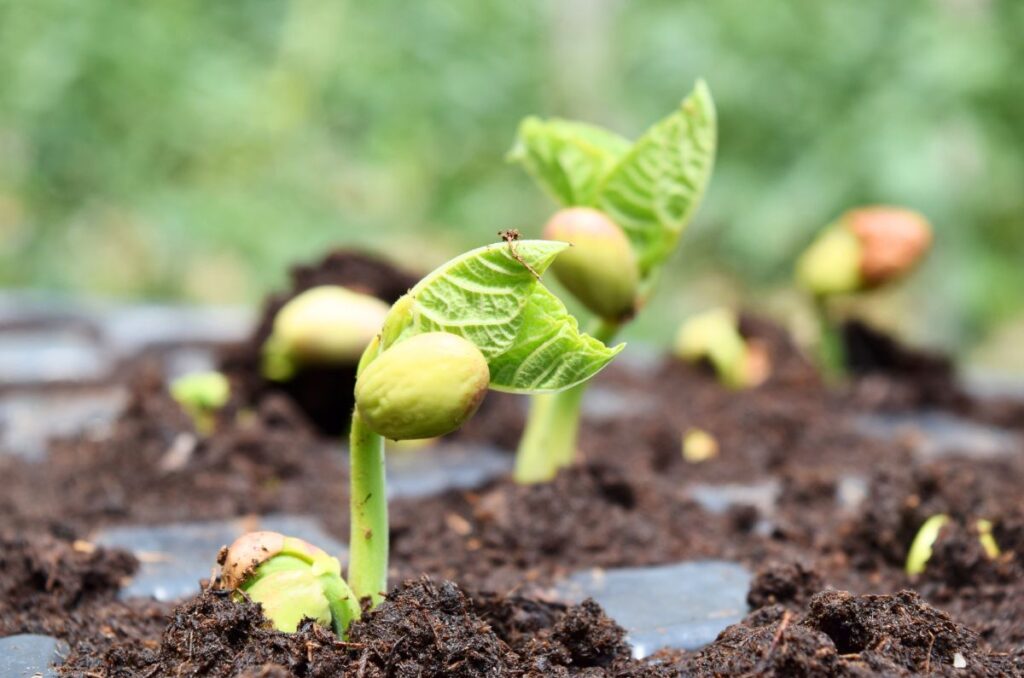
What Plants do Slugs Eat?
Slugs are a non-selective pest, meaning they don’t have one specific host plant. They eat many different plants and don’t really have a favourite.
Here are some of the most commonly attacked vegetables by slugs:
- Seedlings: Newly planted or sprouted seedlings are one of the most common hosts for slugs. Because the leaves are so tender and close to the ground, they are perfect for slugs to eat.
- Leafy Greens: This includes lettuce, kale, broccoli leaves, and others. These plants typically grow in shade, making them perfect for slugs to take over.
- Groundcovers: These plants are very low to the ground, making them a perfect dark and moist area for slugs to hide and eat.
- Shade Plants: Any vegetables or ornamentals that grow in shade are on the table for slugs.
Generally speaking, slugs won’t try to eat plants that are in full sun. This is because the sun will dry them out very quickly and kill them.
Additionally, they won’t eat plants that are very strongly scented or flavoured, like many herbs. This includes rosemary, lavender, catnip, and alliums (like onions and garlic).
Slugs also won’t eat plants with very thick leaves, like succulents and cacti. These plants have leaves that are too large for the slugs to munch.
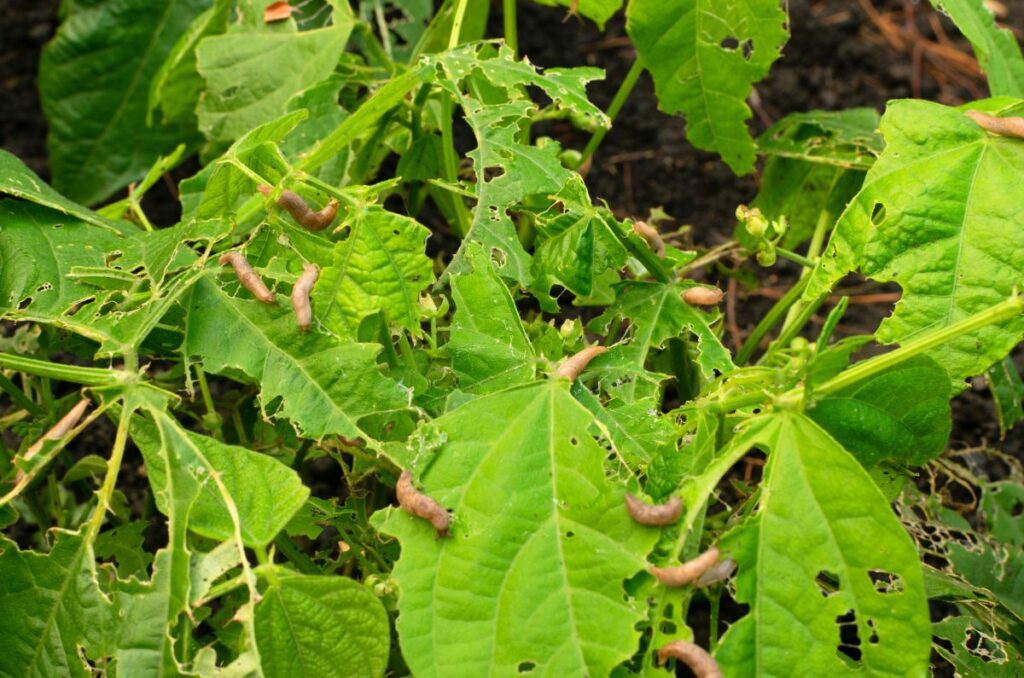
How do I Know if Slugs are Eating my Plants?
There are a couple tell-tale signs that you should be looking out for when determining if slugs are a problem for you.
- Holes in Leaves: If there are holes in your plants’ leaves or there are chunks bitten off, it is likely that slugs caused them. They generally eat like this, chewing through large sections of leaf matter.
- Slimy Trails: Early in the morning, you will see slimy trails that were left by slugs on their way out. It’s kind of stupid for them, because they left all the evidence behind.
If you notice these things in your garden, or if you actually see slugs, then you know that these pests are ruining your crops and they need to be dealt with.
How to Deter Slugs Naturally in the Garden
Let me save you some time; sand, copper tape, eggshells, coffee grounds, or anything else they tell you to use won’t work for deterring slugs. It just doesn’t. Don’t waste your time.
Like just think about it; why would coffee grounds do anything to slugs? There’s so many different things in the soil, and organic matter is one of them.
The methods listed here will actually work for getting rid of slugs in your garden.
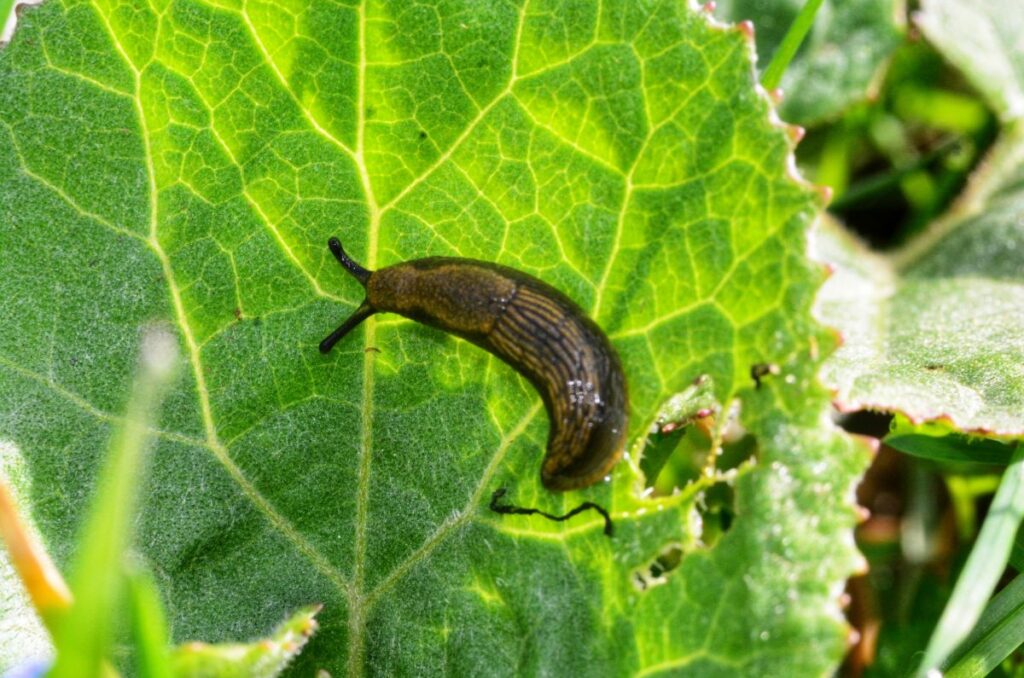
Hand-Picking
This is one of the most effective methods for getting rid of slugs, but it may disgust some gardeners.
That’s because you have to use your working hands to manually pick off all the slugs from your plants. It was disgusting for me at the beginning too, but as I kept doing it, it kinda feels good now.
You get the feeling that you’re murdering those deserving slugs out of cold blood. Perfect.
Make sure to go out in the late evening or early morning, and especially after it has rained; the slugs love these dark and moist conditions.
Check all of your plants, especially the ones most susceptible to slugs. Check the leaves, stems, under the leaves, and around the base of the plants.
When you pick them off, it’s easiest to drown them in a cup of water. However, I like to lay them out on the ground and stomp on them. It helps me to relieve the stress that they caused me.
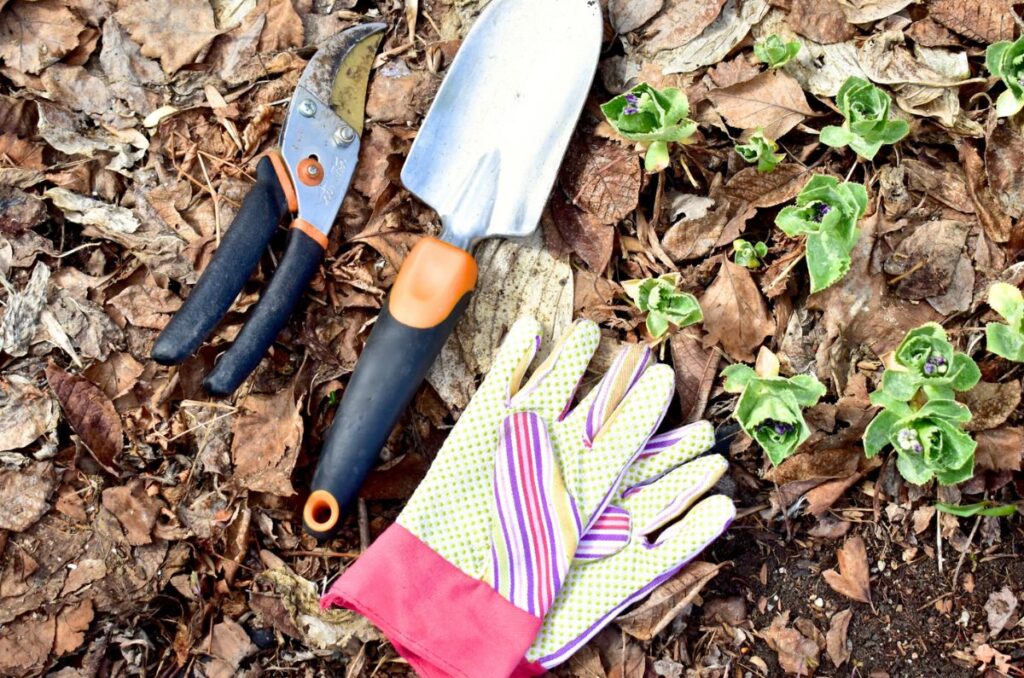
Keep Your Garden Clean
As we know, slugs like to hide under things where it’s dark and moist. If we remove most of these hiding spots, then the slugs won’t come to your garden.
So make sure to clean out piles of debris, wood, and mulch. Either use it, compost it, or get rid of it. If you have to store it for later, then store it in your shed, away from your plants.
Also, make sure to keep your grass cut short, as slugs like to hide in there as well. Remove any weeds too.
You should also have well-draining soil so that water doesn’t pool on the top. Additionally, make sure to water your garden in the morning, so that the surface of the soil dries out before it gets dark. If you water in the evening, it’s going to stay moist all night long.
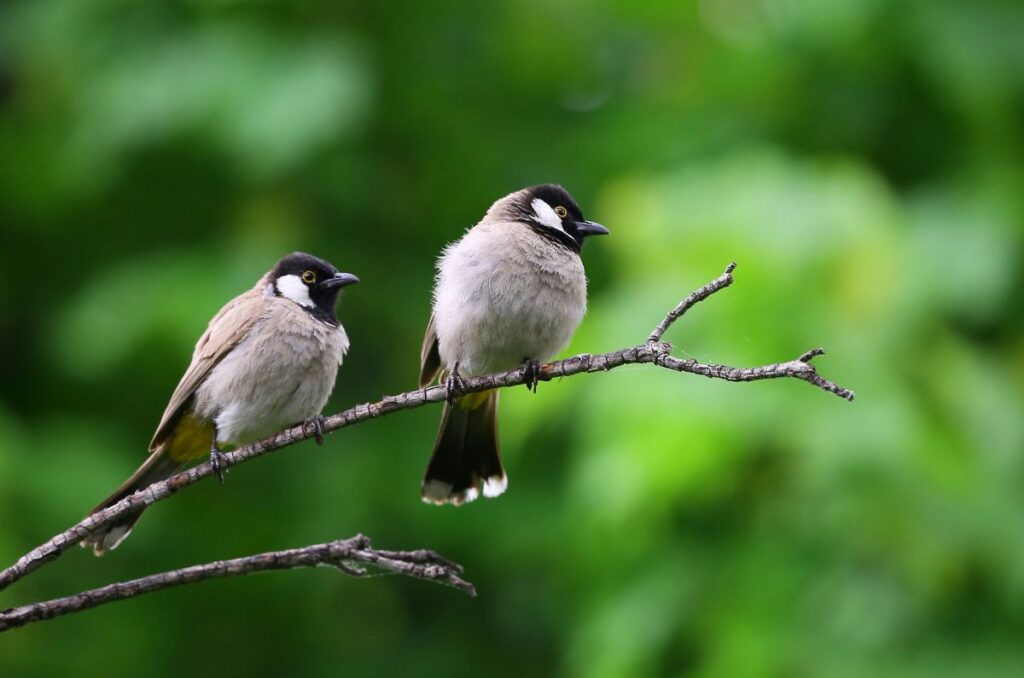
Attract Natural Predators
This is one of the best slug control methods because it increases your garden’s biodiversity. Some animal species actually feed on slugs and other pests, so attracting them can be beneficial.
Here are some beneficial natural predators to attract:
- Ground Beetles: Attract these beetles by creating a small mound of soil or by piling up pieces of rotting wood. This creates the perfect habitat for beetles, which eat slugs.
- Snakes: I know, many of us are afraid of snakes. But really, the species in my area are pretty chill and don’t really attack you unless they are provoked. Keep an area of your grass and native plants growing tall. This will help to attract predatory snakes.
- Birds: Lots of birds need a freshwater source to drink and bathe. Consider adding a bird bath, or placing a container filled with water at ground water. This creates a little pond that birds can reach. Avoid using bird feeders because you want them to eat the slugs, not the seeds.
- Chickens: If you have chickens in your backyard, you can let them run free and they will find all of the slugs for you and eat them. They generally won’t cause too much damage to your plants, maybe just some digging around. But I’ll take it over the slugs any day.
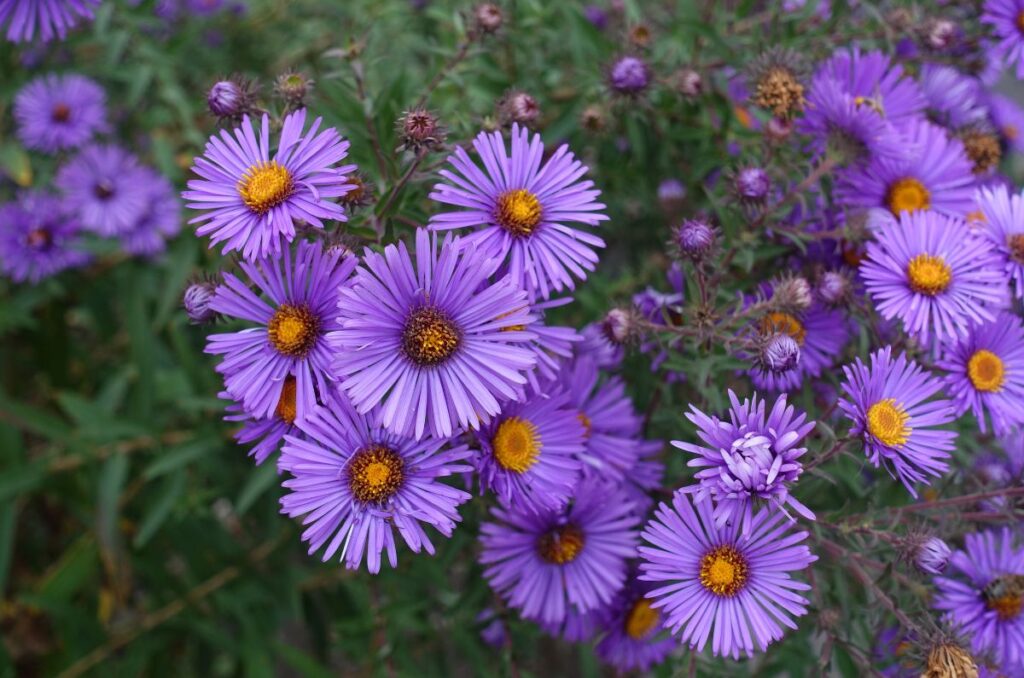
Grow Native Plants
There are lots of beautiful native plants wherever you live, so make sure to plant some in your garden.
If you have the space, you can dedicate a specific area to growing native flowers, shrubs, grasses, and more. These help to attract native predators, like insects, birds, snakes, and frogs.
All of these species will help to control the slug population in your garden.
Make sure your native plants are left to grow wild; don’t prune, mow, deadhead, or anything else to this area. It needs to be native and wild.
Plant nectar-rich flowers, native ornamental grasses, woody plants, ferns, and more. A wide range of different plant species will attract many different beneficial species.
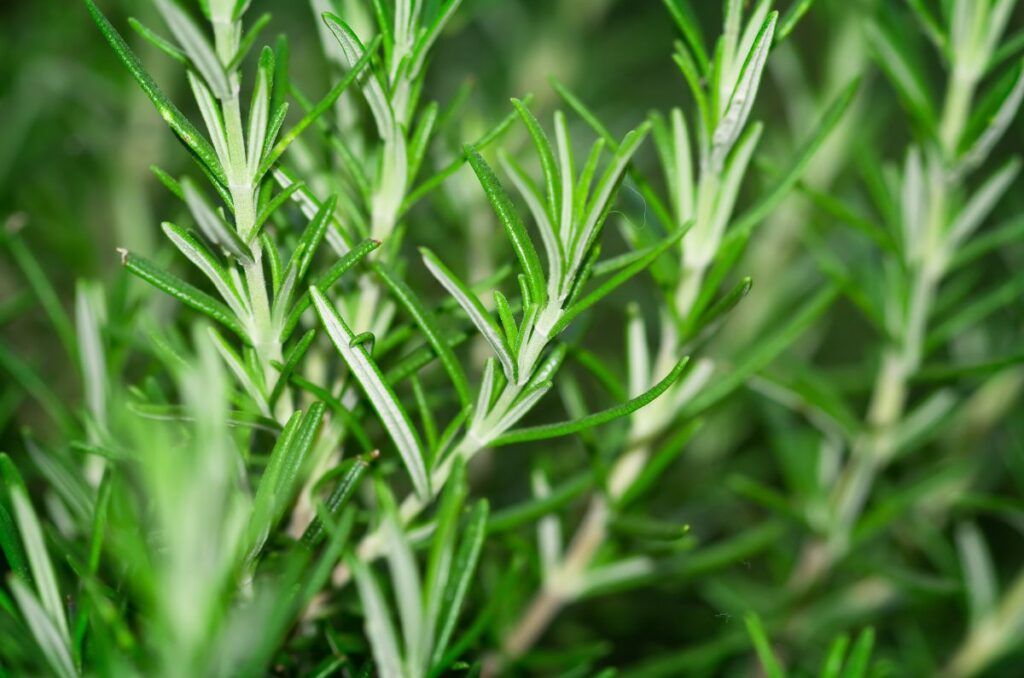
What Plants Deter Slugs?
As we talked about before, certain plants actually deter slugs because of their scent or flavour. Think about those plants that have a very strong smell or are very aromatic.
- Alliums: Crops like onions, garlic, leeks, and chives produce that onion-like scent even in their leaves. Slugs generally won’t go near alliums, so plant them near your slug-infested crops.
- Herbs: Thyme, rosemary, lavender, and mint are very aromatic and produce strong scents. Although we love the smell, slugs actually don’t.
- Trap Crops: These are plants that will attract all the slugs to themselves, leaving other plants free. Brassicas, like kale and mustard, are the most popular slug trap crops.
Plant these crops around other plants that are susceptible to slug damage.
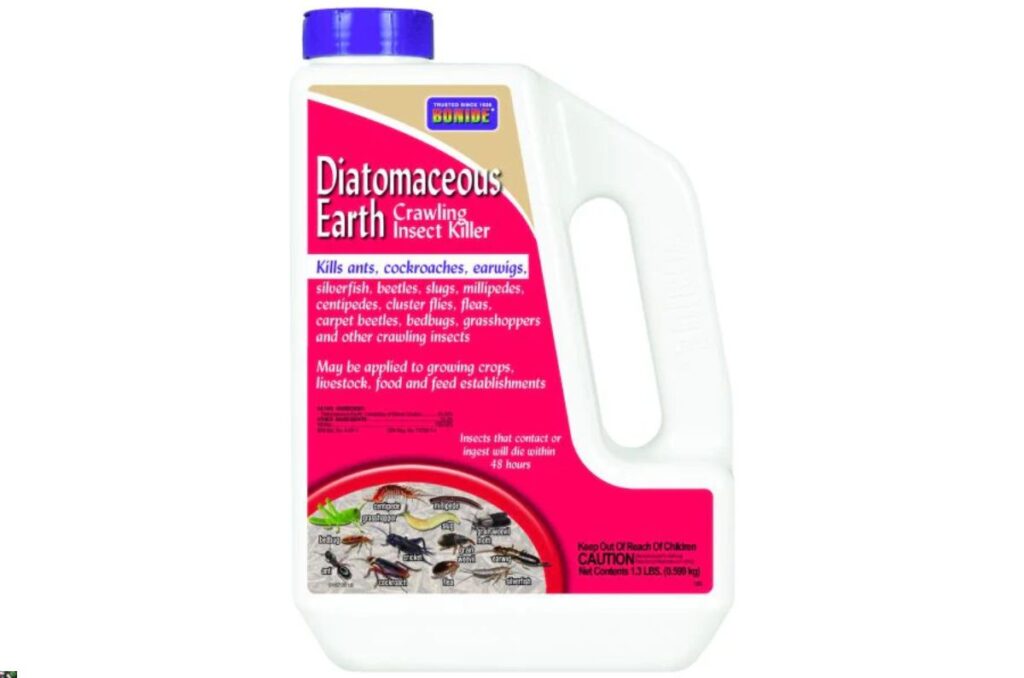
Diatomaceous Earth
You’re probably reading the title right now and thinking, “what even is that?” This is actually the only amendment for slug control that actually works.
There’s this type of algae called diatoms that have a cell wall made of silica (silicon dioxide). As the diatoms live and die over thousands of years, natural silica deposits accumulate in bodies of water.
Diatomaceous Earth (DE) is silica, which is mined from rivers, streams, and lakes. Silica is a natural mineral that is made of very sharp tiny particles.
When you apply DE around your plants, the particles scrape slugs that try to cross it, causing them to dry out and die.
Make sure to wear goggles and a mask when using DE, because the dust can be very harmful when breathed in, but it’s ok on your skin.
Apply a border around your plants with the most slug damage. The slugs will try to cross the DE, but they will quickly realize that they can’t this means that they won’t even be able to touch your plants.
If you water your garden, it rains, or if it’s really windy, you’ll have to reapply the DE around all of your plants. This is the only problem I have with DE, because it can be pretty expensive.
It also works for other insects like fleas, grasshoppers, centipedes, and earwigs.
Check out Diatomaceous Earth on Nature Hills Nursery to learn more.
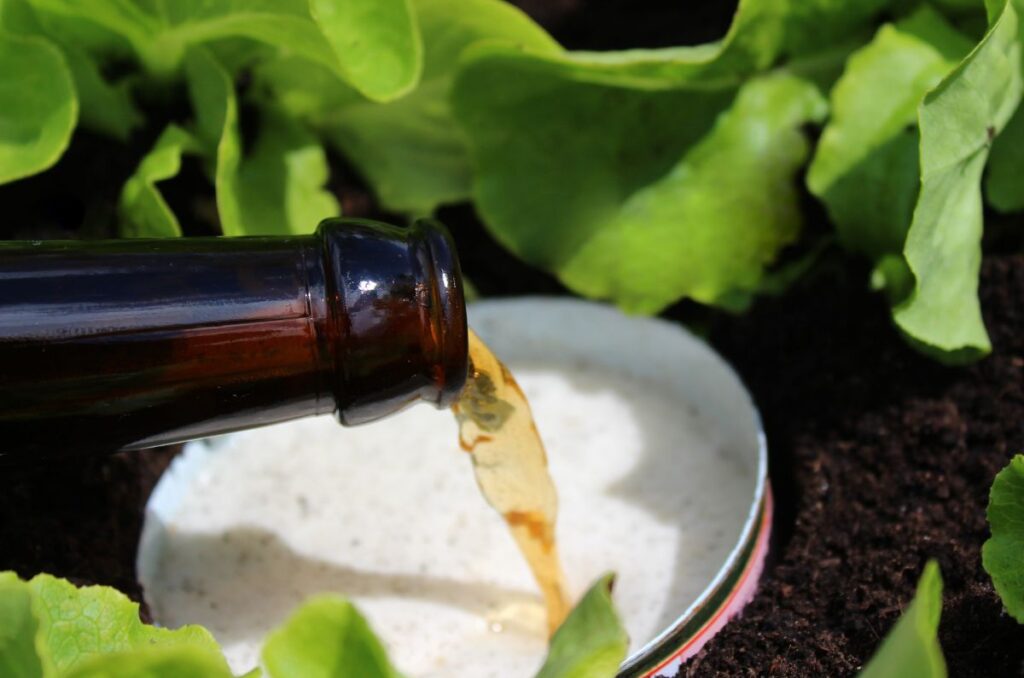
Make a Slug Trap
Although we want to deter slugs from our gardens, this is a way to attract more of them so that we can get rid of them all at once.
There are a couple of different types of traps that work for trapping slugs:
- Beer Trap: Fill a small container with beer and place it at ground level. The slugs are naturally attracted to the fermented yeast smell. They will crawl into the container and either drown or be poisoned by the alcohol. You should be able to get a few slugs every morning, and just replace the beer every couple of days.
- Board Trap: Place a wooden board on top of your garden soil. This will create the perfect dark and moist environment that slugs love. Flip over the board every morning to collect the slugs and drown them in water or squish them.
These traps work to gather all of the slugs in your garden in one area, allowing you to properly get rid of them.
Should I Use Slug Bait?
Most slug baits contain a toxic chemical known as metaldehyde. Metaldehyde is not approved for organic growing and it should never be used in your vegetable garden.
Don’t get stuck using these toxic substances because they will only hurt your garden in the long run.
Although the organic methods might be more upfront work, they work better for longer, leaving your garden healthier than before.
If you can find an organic slug bait, then you can use it for your garden. I haven’t used them too much, so I can’t comment on how well they work.
Frequently Asked Questions
You can kill slugs with salt, but that also may affect the growth of your plants. Salt is harmful to most plants, so don’t go sprinkling it around your garden. You can use Diatomaceous Earth instead.
Obviously you should not ingest any slugs, but you can touch and handle slugs with no issue in your garden. If you are worried, then just use gloves next time.
The effects of chili powder slowly wear off once it has been out for so long. If you put it around your plants, it will naturally decompose and won’t really do anything to slugs.
When you spray neem oil on your plants, it coats the leaves with a bitter layer. This puts the slugs off, meaning they won’t attack your plants. The only problem is that you have to constantly spray your plants with neem oil.
Even More Gardening Ideas
Here are a few more posts to help your garden ideas take root:
- Why are my Seeds not Germinating?
- How to Grow Radishes from Seed to Harvest
- 20 Fast Growing Vegetables to Harvest in Under 60 Days
If you liked this article, make sure to share it with your friends and family members who are also looking to grow a productive vegetable garden. Also, consider signing up for our email newsletter; don’t worry, we won’t send you spam, just fresh gardening ideas every week!
If you want to learn more about vegetable gardening, check out The Real Gardener on Facebook, YouTube, and Pinterest.
Pin this post for later:
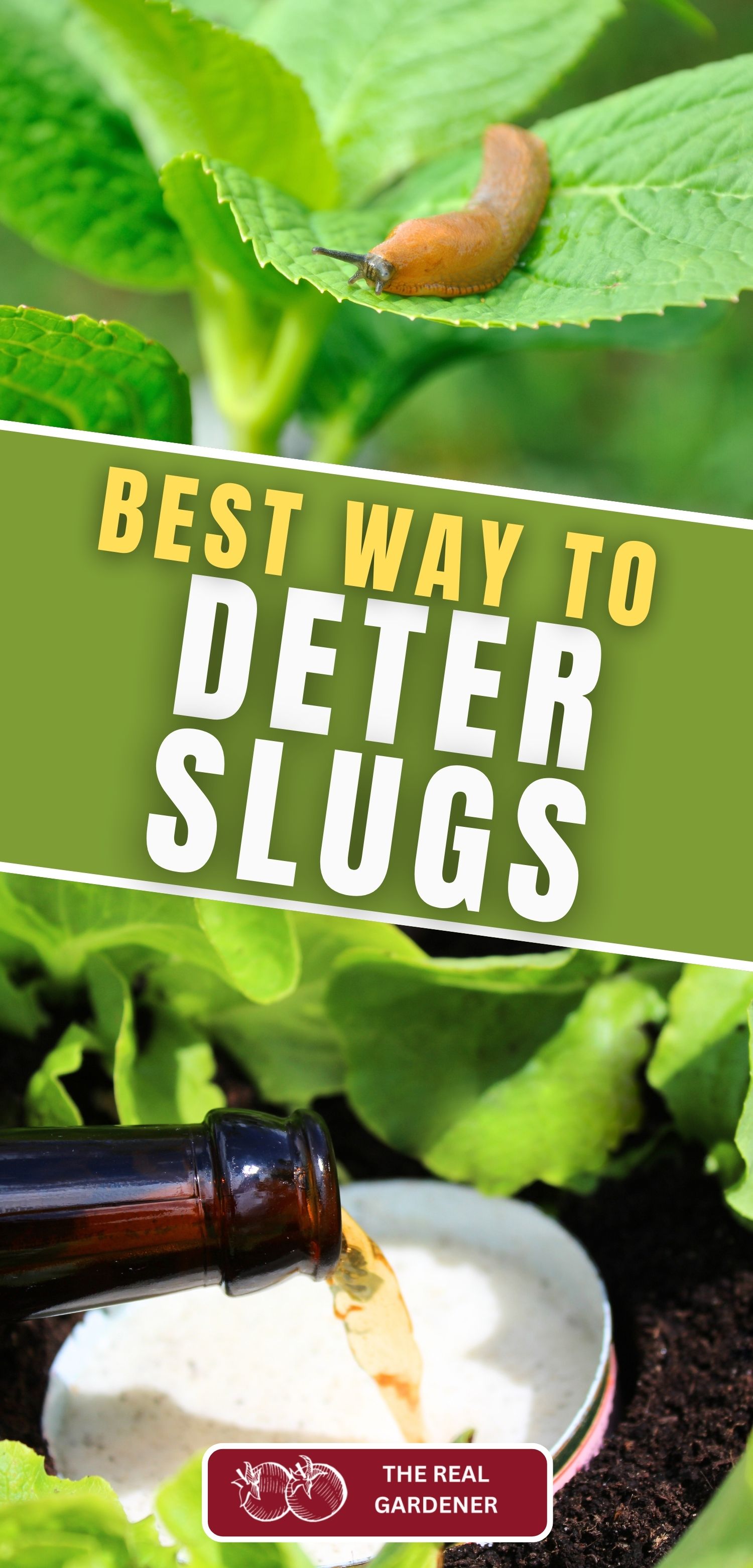
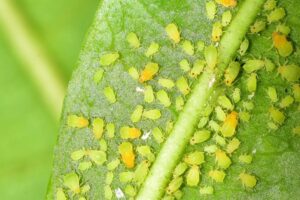
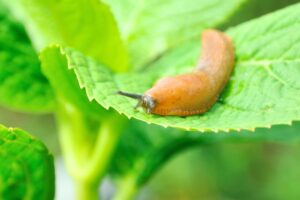
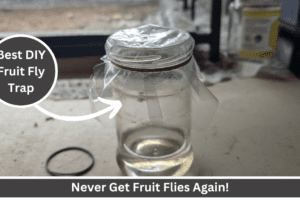
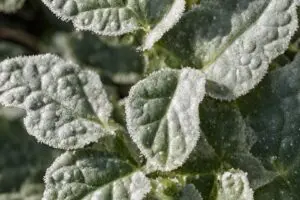
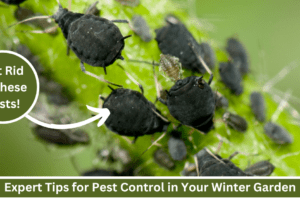
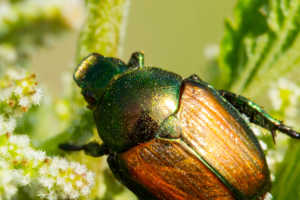
Leave a Reply